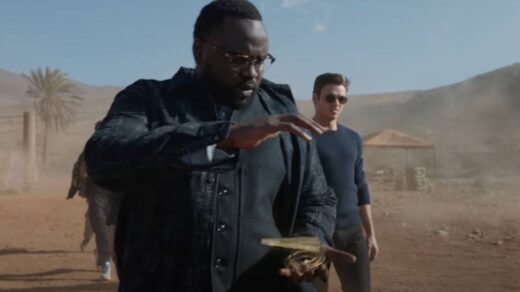After a dark week, we can all use some light and love from Shirley MacLaine
Author: John Casey
All my life I have loved Shirley MacLainePenguin Random House
The book feels like you’re sitting next to MacLaine going through a photo album, while she touches on the high points of each picture. Her life has been an unrivaled odyssey of famous names, world leaders, and great thinkers of the 20th century.
“I loved Stephen Hawking. We were such good friends,” she said matter-of-factly. “Every time he came to California, I had a party for him. He was a sweetheart. He was very, very human. I was so impressed with his sense of human nature.”
“While I was reading your book, I kept thinking if I was born 30 years earlier, you and I would have had a hell of a good time,” I told her. “Well, who knows, maybe we will in our next life!” I can only hope and pray.
MacLaine’s career and that incomparable spirit embody the essence of Hollywood glamour and resilience, spanning over seven decades. She first captivated audiences in the 1950s with her film debut in The Trouble with Harry (1955), directed by Alfred Hitchcock. “I had just gotten married, knowing that Hitchcock hated lovers and husbands,” she explained. “Plus, he liked thin blondes, and I had red hair and wore a size 12.”
Known for her versatility, she moved seamlessly between comedy and drama, securing roles in classics like Some Came Running (1958) and one of my all-time favorites, The Apartment (1960) with my all-time favorite actor Jack Lemmon. What was he like? “He was such a lovely man,” she told me.
Keep up with the latest in LGBTQ+ news and politics. Sign up for The Advocate’s email newsletter.
There are many other films, but my world stopped with her truly unforgettable role in Terms of Endearment (1983), where she won the Best Actress Oscar for her portrayal of Aurora Greenway, who is without question my all-time favorite film character. “That’s when I knew that I had made it to the pinnacle of Hollywood,” she informed me. “It’s also my favorite movie and film.”
She reprised the role 13 years later in a sequel, The Evening Star. And though the film got lukewarm reviews, seeing Aurora again on-screen was mesmerizing. Any time I see pasta primavera on a restaurant menu, I repeat a line from that film. “I hear the pasta primavera is to die for.” You only understand the hilarity behind that line if you see the film.
The concept of MacLaine’s book also reminded me of something Aurora did in that film. Toward the end of her life, she started a scrapbook of all the loves in her life that included family, friends, and lovers. In so many ways, that’s what MacLaine’s new book is.
“Wow, that’s interesting that you tell me that, because I hadn’t thought about it,” she recollected. “I’d like to take credit for it, but it wasn’t my idea. I think that was such a wonderful touch for Aurora.”
Beyond her remarkable acting portfolio, MacLaine’s openness about her spiritual beliefs, reincarnation, and metaphysics has become a defining aspect of her public persona. She has authored several best-selling books on these subjects, including Out on a Limb (1983), introducing audiences to her worldview and adding an introspective layer to her public image.
She’s the recipient of the American Film Institute’s Lifetime Achievement Award, and she remains a trailblazer not only in her acting but also in her willingness to defy Hollywood’s conventions. MacLaine’s life and career continue to inspire, marking her as one of the entertainment industry’s most cherished and intriguing figures.
And defying conventions includes her longtime marriage to Steve Parker. They married in 1954, and before they did, he sprung a surprise on her. He said, “You must never tell anyone … I am undercover with military intelligence and work in Japan regularly as well as other places throughout the world.” She married him anyway, because she loved him, and because of their jobs, they eventually agreed to an open marriage.
I told MacLaine that gay men are often ridiculed for having open marriages, but she and Parker were an example of it working to a certain degree.
“Every couple has a different set of sexual values and personal values,” she began. “And really, honestly, not everybody is made for marriage. And other people who are married are not made for the freedom of an open marriage. They like being with one person. Everybody is so different that you can’t say whether it’s right or wrong for anyone.”
Was it a happy marriage? “I’m not sure it was a happy marriage, but it worked. He had someone in Japan while I had my relationships.” Those relationships included some illustrious names like actors Danny Kaye and Robert Mitchum. “The first time Steve and I talked about it was when I was with Mitchum. We didn’t want to divorce because we had so much invested in our marriage.”
In the book, she reveals friendships or platonic relationships with world leaders like Russian’s Nikita Khrushchev, Cuba’s Fidel Castro, India’s Prime Minister Jawaharlal Nehru, and his daughter, Indira Gandhi. And she’s met 13 U.S. presidents. “Jimmy Carter was my favorite,” she told me. “He was the friendliest and certainly the most human.”
As we wrapped up our call, I told MacLaine something that she already knew: “I love you, Shirley.” “I love you too, John,” she replied. When we hung up, I said to myself, “Now I can die after Shirley MacLaine told me she loved me.”
And while I’m in no hurry, I realized that dying wouldn’t be such a bad thing, since there’s a chance Shirley and I would meet in the next life and do some serious hell-raising.
From Your Site Articles
Original Article on The Advocate
Author: John Casey




